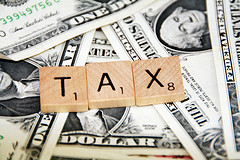We’ve written on this topic before, right around tax time. But a few recent news articles have gotten us thinking about taxes and how they negatively impact small business.
 Startups already face a huge hurdles just trying to get up and running. So it’s maddening when the government’s tax policy is shaped in a way that hurts new businesses far more than established corporations. (Big corporations like it this way. It helps keep potential competitors away.)
Startups already face a huge hurdles just trying to get up and running. So it’s maddening when the government’s tax policy is shaped in a way that hurts new businesses far more than established corporations. (Big corporations like it this way. It helps keep potential competitors away.)
Here’s how the US Federal Government’s current tax policy hurts small business:
1. Today, the United States has the highest business tax rate in the world: 35% (plus an average additional state tax of 4.1%). But not all businesses pay that rate (in fact very few do). Big corporations have worked with law makers to create loop holes and special deductions that reduce the taxes they pay. This is why we hear about Apple, Google, General Electric, and Microsoft keeping billions of dollars in off-shore tax havens and away from the tax collector.
Small companies and new startups don’t have the financial resources or the army of tax attorneys to take advantage of these loop holes. So they have to pay taxes at regular rates while their richer, bigger competitors don’t.
We don’t blame big corporations for taking advantage of tax laws. It’s legal and in the best interests of their share holders. However, we do blame law makers for setting up a tax system that unfairly favors big corporations over smaller competitors. This isn’t right and needs to change.
2. Another way the current tax system favors big companies over smaller ones comes from the fact that debt payments are tax deductible. This has two very negative effects. The first is that companies are incentivized to finance investments and growth from debt (and get a nice tax break in the process), which can be risky and make the economy more susceptible to crashes when things go bad.
Secondly, because small companies don’t have the same financial resources and are less able to borrow money, they are less able to finance their growth and new investments with debt. Instead they rely on equity and cash flow for new investments. Because incoming cash is taxed (at nearly 40%) even if it is ear-marked for investment, this reduces the amount smaller companies can invest. And there is no corresponding tax break. That hurts small business employees, suppliers, and customers (and gives the big corporations an enormous competitive advantage). Like we said above, this isn’t right and it needs to change.
3. Because many small businesses are structured as partnerships, sole proprietorships, or S Corporations (which are taxed at the same rates as individuals), when Congress increased the top individual tax rates, these small companies (with significant income) also saw their taxes go up—a rate that is 13% higher than the rate paid by big corporations. Again, that’s not tax fairness.
It’s time for the American Government to make the corporate tax laws fair to small businesses. All profitable companies should pay the same rate (without special deductions or favors) on their profits.
Photo credit: Alan Cleaver via photopin cc







